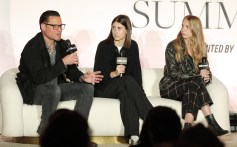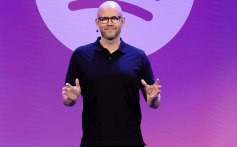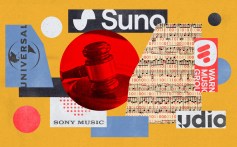Business
Page: 21
Trending on Billboard
Imagine the distance between Las Vegas and Chicago. Now imagine a line of 20 million stacked plastic cups and single-use serveware items extending along the 1,700-mile route.
According to reuse company r.World, that’s the actual cumulative number of plastic cups and single-use serveware items it and its partners have kept out of landfills since r.World launched in 2017.
Related
R.World provides reusable cups and serveware to venues and events, which are then returned by fans and sent out for cleaning at nearby r.World wash stations. R.World products are now in and at venues and events including Crypto.com Arena, Peacock Theater, Red Rocks Amphitheatre, Warped Tour and myriad Goldenvoice festivals. The company has also partnered with artists including Chappell Roan, Billie Eilish and Coldplay.
According to r.World, its work has thus far stopped more than 110 tons of plastic from being produced (netting out any plastic the company itself used), thereby eliminating 440 U.S. tons of CO2 emissions, saving 1,650,000 kWh of energy and conserving 5,000,000 gallons of water — amounts representing the creation and transport of these single-use items. Every cup or piece of serveware the company delivers that’s then returned is counted to ensure accurate environmental impact tracking and reporting.
“There is tremendous new growth in the world of reuse,” r.World founder Michael Martin tells Billboard. “When we launched the reuse movement back in 2017, no one was doing reuse. Now NFL, NBA, NHL, MLS, MLB and college stadiums are implementing reuse. As more and more venues realize the economic and environmental benefits of doing reuse, we are adding more clients every month.”
Martin says the company will be announcing a host of new partners in the coming weeks. Still, amid this growth, he says the biggest hurdle remains the fear of change and misinformation that exists in the marketplace, along with an “imagination gap” in terms of how reuse works. He notes that reuse can save venues money; that it’s a “vastly better” environmental solution than single-use aluminum cups, compostable cups, souvenir cups or plastic cups; that the reuse system is easy; and that guests and servers love it.
Related
“Reuse is common in most developed countries. The U.S. was behind,” Martin says. “As more and more U.S. venues are discovering the benefits of reuse, the demand is skyrocketing. The country’s leading venues are moving to reuse and away from single-use.”
Many scientists have noted that the world is currently in a “plastic crisis,” with these items contaminating natural spaces and waterways, harming wildlife and humans. Health Policy Watch reports that 98% of plastics are made from fossil fuels, with plastics “polluting human health through an array of pathways, including direct exposure to waste fills or chemical plants, environmental contamination, absorption through food packaging, microplastics, air and soil pollution, and burning of feedstock fossil fuels.”
R.World is one of several initiatives aimed at dramatically bringing down the use of single-use plastics in the music industry and beyond. In September, electronic producer Blond:ish announced Zero Plastic Club: NYC, a project that’s working to rid New York City dancefloors of single-use items like bottles, cups and wristbands.
“The movement toward reuse is a collective effort, built on partnerships and shared values, with contributions from venue managers, beverage companies, promoters, artists, and fans,” says Martin. “Every time a fan returns a reusable cup instead of throwing one away, they play a part in a larger transformation.”
Trending on Billboard
Sphere Entertainment Co. reported on Tuesday (Nov. 4) that the success of The Wizard of Oz and the Backstreet Boys residency at its state-of-the-art Las Vegas venue boosted revenue and operating income — though those gains couldn’t offset a nearly $130 million operating loss in the third quarter.
Sphere Entertainment generated revenue of $262.5 million, up 15% or $34.6 million, for the quarter ending Sept. 30, compared to the same period last year. Adjusted operating income, an indicator of how much of a company’s revenue will eventually become profit, rose to $36.4 million from negative $10.2 million a year ago. The company also reported an operating loss of $129.7 million, up $12.1 million from a year ago.
Related
Since opening in 2023, Sphere has become a destination for artist residencies, hosting acts including U2, Phish, the Eagles, electronic act Anyma and now the Backstreet Boys, who recently extended their Into the Millennium residency into February 2026. Upcoming acts include the DJ/producer Illenium, who’s slated for a residency in March and April, and No Doubt, which will play the venue beginning in May.
When Sphere isn’t occupied by a concert, the mega-venue also shows movies, including the U2 immersive concert film recording of its U2:UV Achtung Baby Live residency and The Wizard of Oz at Sphere. The company’s executive chairman and CEO, James Dolan, has said that recording, licensing and adapting these films costs significantly less than live performances and presents meaningful upside revenue.
The Wizard of Oz at Sphere — an immersive adaptation of the classic 1939 movie — has sold more than 1 million tickets and generated more than $130 million in sales since its Aug. 28 premiere, the company reported late last month.
Related
In a statement, Dolan called The Wizard of Oz “the best example to-date of experiential storytelling in this new medium.”
He added that the film “has been met with strong consumer demand. Looking ahead, we believe our Company is well positioned for long-term growth as we continue to execute on our global vision for Sphere.”
Quarterly revenue generated by the company’s Sphere segment rose 37% overall to $174.1 million in revenue over the same period last year, boosted by $28.3 million more in revenue coming from the venue’s film screenings, collectively known as The Sphere Experience.
The Sphere Experience posted higher per-show revenue from its 220 showings (up from 207 last year) of three movies: Postcard from Earth, the immersive U2 concert film and The Wizard of Oz at Sphere. An additional 16 concert residency shows compared to the prior year quarter also helped boost event-related revenue by $15 million, though that was offset by “lower average per-concert revenue due to the mix of concerts” and the absence of big sporting and corporate events in the quarter. Sponsorship and advertising on the outside of Sphere, along with suite licensing fees, rose $2.7 million from a year ago.
Related
But more movies and shows mean more expenses, and those associated with The Sphere Experience rose by about $10 million. Meanwhile, event expenses primarily from residency shows rose by nearly $4 million, contributing to an overall 26% increase in the Sphere segment’s operating expenses, which totaled $78.7 million for the third quarter.
Overall, the Sphere segment posted an operating loss of $84.4 million — a $40.6 million improvement from last year — and adjusted operating income of $17.1 million.
Elsewhere, MSG Networks revenue fell 12% to $88.4 million on a more than 13% decline in subscribers and a $12.7 million decrease in distribution revenue.
Trending on Billboard
Some Taylor Swift fans are up in arms over a video on the official White House TikTok account set to “The Fate of Ophelia” — and many of them are encouraging the pop superstar to take legal action against President Donald Trump.
The Monday (Nov. 3) TikTok video pairs Swift’s The Life of the Showgirl lead single — currently in its fourth week at No. 1 on the Billboard Hot 100 — with images of Trump and his associates. One frame shows Trump’s mug shot while Swift sings, “Don’t care where the hell you’ve been.” The video ends with a photo of the president scooping McDonald’s French fries under a slightly altered lyric reading, “The fate of America.”
Related
Swift has not commented on the post, but it’s unlikely that she’s happy about it. Historically, the star has not pledged her allegiance to Trump’s team; she’s only endorsed Democrats, including Kamala Harris in the 2024 election, and Trump, in turn, has insulted Swift repeatedly, including by posting “I HATE TAYLOR SWIFT” after the Harris endorsement.
In the TikTok comments, some Swifties are putting on their lawyer hats. “TAYLOR SWIFT SUE THEM FOR USING YOUR SONG!” wrote one. “I would absolutely LOVE if Tay found a way to sue them for this,” wrote another. “One freaking huge lawsuit on the horizon,” another prediction read.
Is the White House’s use of “The Fate of Ophelia” legal? Probably not. While individual TikTok users can soundtrack their videos with pre-cleared songs, commercial entities are required to obtain so-called sync licenses from copyright owners. The White House did not return an inquiry on Tuesday (Nov. 4) as to whether they got a sync license for the post, but given Swift’s public rebukes of Trump, and the fact that the singer is famously protective of her catalog, it’s unlikely that she greenlit such a license.
Related
As Billboard previously reported during Zach Bryan’s public scuffle with the Trump administration over its use of his track “Revival” in an X post, there are a number of legal avenues for artists to take when their songs are used on social media without licenses. Swift’s lawyers could send a cease-and-desist letter to the White House, or they might lodge a formal takedown notice directly with TikTok under the Digital Millennium Copyright Act.
If these administrative procedures are unsuccessful, Swift could indeed bring a formal lawsuit against the federal government for copyright infringement. She’s no stranger to intellectual property litigation, having both faced copyright claims herself and gone on the legal offense over the years.
However, it’s hard to imagine Swift taking the drastic step of suing the White House. The courts are public by nature, and Swift has a carefully maintained image. This is especially true in the political arena, where the singer’s statements have always been measured (“The choice is yours to make,” she told fans in her post endorsing Harris last year).
Related
Swift, therefore, may not want to become publicly embroiled in what would almost certainly be viewed as a partisan legal battle. Nothing is certain, though, and only time will tell.
Swift’s reps did not return a request for comment on the matter.
Trending on Billboard
CMT’s flagship show, the Hot 20 Countdown, will conclude at the end of the year, Billboard has learned from sources.
The program, hosted by Cody Alan and Carissa Culinar, has run on CMT since 2013. The show counts down the 20 hottest country music videos and features appearances by country artists.
Related
The Hot 20 Countdown is the last original regular music programming on the channel, which has experienced continual cutbacks in staff and programming over the past year and a half. This spring, for the first time since its debut in 2002, the CMT Awards were paused as parent Paramount Global merged with its new owner, Skydance Media. That deal closed in August.
Though non-music related, CMT does still air original programming, with the Taylor Sheridan-produced The Last Cowboy, a horse-reining rider talent competition. The sixth season premieres on Friday (Nov. 7). Last week, it was announced that Yellowstone creator Sheridan will leave Paramount in 2028 for a new deal with NBCUniversal.
As with the other Paramount-owned linear channels, there has been a massive talent drain at CMT over the past 18 months, including Leslie Fram, senior vp of music strategy and talent, who left last fall, as did director of music and talent Stacy Cato, vp of production; Quinn Brown, vp of production; Ray Sells, senior director of production and Darrell Hughes, senior producer of Hot 20 Countdown, among others.
Related
This fall, there have been more cuts and buyouts, including Donna Duncan, vp of CMT music and talent, who left in September. Last week, as around 1,000 people were cut across Paramount, Margaret Comeaux, the highest-ranking executive still at CMT, who serves as senior vp of production, music & events, announced she will leave the company in December after 24 years. (Comeaux also serves as an executive producer on Hot 20 Countdown.) Melissa Goldberg, who had been CMT’s vp of digital and social, left the company to join sports and entertainment company Teton Ridge in October.
Even before the merger, Paramount Global had been chipping away at original content on CMT and other websites. In June 2024, Paramount stopped producing original content for many of its cable channels’ websites, including CMT.com, which had been a robust site for years, and began directing visitors to content on Paramount+ and other sister outlets.
CMT’s daytime programming consists primarily of classic sitcoms, including Reba, Roseanne, Mama’s Family, King of Queens and Golden Girls, as well as movies like Raiders of the Lost Ark. Music videos run overnight between 12 a.m. and 6 a.m. In addition to new episodes premiering on Saturday mornings, the Hot 20 Countdown repeats on Sunday mornings.
In broader Paramount Skydance news, the company announced today that George Cheeks, chair of TV media, who oversees CBS, will now also oversee the cable networks. Laurel Weir, who reports to Cheeks, will oversee programming for Paramount TV Media, including CMT.
Billboard has reached out to Paramount for comment.
Trending on Billboard
Live Nation’s revenue grew 11% year over year to a third-quarter record of $8.5 billion, the company announced Tuesday (Nov. 4).
The world’s largest concert promoter and ticketing company continued to benefit from vigorous consumer demand for live music since the touring business came back from the COVID-19 pandemic. Adjusted operating income (AOI) of $1.03 billion was a 14% increase from the prior-year period. Importantly, event-related deferred revenue and Ticketmaster deferred revenue were up 37% and 30%, respectively, suggesting Live Nation is well situated for upcoming quarters.
Related
“Strong fan demand drove another record quarter, as we continue to attract more fans to more shows globally,” CEO Michael Rapino said in a statement. “With these tailwinds, 2026 is off to a strong start with a double-digit increase in our large venue show pipeline and increased sell-through levels for these shows.”
Foreign exchange had a small impact on reported results. In constant currency, revenue was up 9% (compared to 11% as reported) and AOI was up 12% (compared to 14% as reported).
Within the concerts division, record-high stadium show attendance drove revenue up 11% to $7.3 billion and AOI up 8% to $514 million. Live Nation hosted 51 million fans, and attendance was up by double-digits in all major markets. International markets were led by Europe and Mexico, where attendance growth reached double-digits.
Related
Fan demand has undergone explosive growth since the COVID-19 pandemic. Live Nation’s third-quarter revenue of $8.5 billion was 38% greater than the $6.15 billion it generated in the same quarter of 2022. That improvement is dwarfed by the 125% revenue growth the company has experienced since the third quarter of 2019, a time before Live Nation acquired a majority stake in Mexican promoter OCESA in 2021.
Within the Venue Nation segment, Live Nation’s division that owns and operates venues worldwide, fan spending through October rose 8% at amphitheaters and 6% at major global festivals. Investments in renovations have helped some venues improve fan spending. For example, onsite fan spending at Jones Beach in New York was up 35% through October, while onsite spending at Estadio GNP in Mexico City tripled in the first ten months of the year.
At Ticketmaster, Live Nation’s ticketing division, revenue climbed 15% to $798 million while its AOI jumped 21% to $286 million. The improvement came from a combination of more ticket sales and higher average ticket prices: In the quarter, fee-bearing tickets rose 4% to 89 million, while fee-bearing gross transaction value (GTV) rose 12%.
Related
Through the first nine months of 2025, Ticketmaster’s total fee-bearing GTV rose 7% due to a 16% increase in international markets. Primary fee-bearing GTV improved 8% while secondary GTV declined 1% on lower sports activity.
Live Nation’s sponsorships division had record revenue of $443 million, up 13% from the prior-year quarter. With a gross margin percentage of 71%, the highest of the company’s three divisions, sponsorship’s AOI of $313 million, up 14% year over year, bested Ticketmaster on 44% less revenue.
The number of the sponsorships division’s strategic partners rose 14%. New agreements include consumer brands Hollister, Kraft Heinz and Patrón. The division added a multi-year deal with Trips.com in Asia and expanded its partnership with Mastercard to additional markets, including Hong Kong, South Africa and the Middle East.
Related
Live Nation is on pace for a record-setting 2025. Through the first nine months of the year, revenue is up 8% to $18.89 billion and AOI is up 9% to $2.17 billion. The record-setting third quarter is expected to flow into a strong fourth quarter. Arena, theater and club shows will bring the company to full-year attendance of approximately 160 million, which would be a 6% increase from the 151 million fans it saw in 2024. Live Nation expects to deliver double-digit AOI growth for the full year.
Looking ahead to 2026, the company expects continued growth. In addition to growth in deferred revenue — money received for future events — Live Nation expects a double-digit increase in large venue shows in 2026. Average grosses for 2026 concerts are up double-digits on strong sell-through levels.
Trending on Billboard
The Oasis Live ‘25 Tour kicked off its Australian leg last week (Oct. 31), and it continues to dominate music headlines as the shows roll along.
In a landmark move for Australia’s live music sector, Victoria’s government shut down bulk ticket scalping for Oasis’ recent Melbourne shows (Oct. 31, Nov. 1-4) at the Marvel Stadium by designating them under the Major Events Act 2009. The act allows the Minister for Tourism, Sport and Major Events to formally declare events that then become subject to anti-scalping protections.Under this special declaration, it became illegal to advertise or resell tickets on platforms such as Viagogo and StubHub for more than 10% above the original face value; if they flouted these restrictions, scalpers could be fined between $908 and $545,000 (AUD). A subsequent report from the Herald Sun states that 180,000 tickets for the sold-out shows went to fans as a result of the government effectively shutting out scalpers.
Related
Oasis’ management applauded the news, saying it could set a new benchmark for fairness in the live music market. “It’s great to see Victoria’s Major Events Declaration doing exactly what it’s meant to — Viagogo can’t list our Melbourne shows — and that’s a huge win for real fans,” they told the Herald Sun.
“When the government and the live industry work together, we can stop large-scale scalping in its tracks,” they added. “We’d love to see other states follow Victoria’s lead so fans everywhere get a fair go.”
Before last week, Oasis had not performed in Australia in nearly two decades. After tonight’s (Nov. 4) final Melbourne gig, they’ll head to Sydney (Nov. 7 and 8), before performing across Argentina, Chile and Brazil, wrapping up proceedings in São Paulo on Nov. 23.
Earlier this month in the U.K., the country’s culture minister, Ian Murray, confirmed that the current Labour government will press ahead with plans for a price cap on resale tickets.
Related
An industry consultation that took place in January invited views from venues, promoters, fans and other parties on the proposed price, which ranged from no profit being permitted on any ticket to a mark-up of up to 30% of face value.
Writing in the Daily Record last month (Oct. 5), Murray said: “We asked a direct question — should the UK follow countries like Ireland, where resale profiteering is capped in law? The response from fans could not have been a clearer — ‘yes.’”
“So let me tell you what we’re doing,” Murray continued. “First, we will cap resale prices. No more outrageous mark-ups of 500% or 1,000%. We are examining a range of options, from face value to a reasonable uplift.”
UK Finance, which represents 300 financial services outfits including Lloyds, NatWest, HSBC and Barclay, has lobbied against the decision for fear of customers losing out in an unregulated market. Adam Webb of the Fan Fair Alliance, however, disputed these claims in an interview with The Times. “I would advise UK Finance actually speak to experts in those countries, rather than rely on the self-interested research of unregulated offshore websites who promote industrial-scale ticket touting and exploit British audiences,” he said.
Trending on Billboard
THE BIG NEWS: Universal Music Group and artificial intelligence music service Udio reached a landmark agreement last week to end their lawsuit – the first major settlement in the battle over the future of AI music. Here’s everything you need to know.
The deal, announced Wednesday, will end UMG’s allegations that Udio broke the law by training its AI models on vast troves of copyrighted songs — an accusation made in dozens of other lawsuits filed against booming AI firms by book authors, news outlets, movie studios and visual artists. The agreement involves both a “compensatory” settlement for past sins and an ongoing partnership for a new, more limited subscription AI service that pays fees to UMG and its artists.
Related
-The agreement is much more than a legal settlement, Udio CEO Andrew Sanchez told Billboard’s Kristin Robinson in a detailed question-and-answer session just hours after the news broke: “We’re making a new market here, which we think is an enormous one.”
-The deal between UMG and Udio will resolve their legal battle, but broader litigation involving rival AI firm Suno and both Sony Music and Warner Music is still very much pending. Are more settlements coming? Does the deal impact the case? Go read my look-ahead analysis of the ongoing court battle.
-Will AI do more harm than good for the music business? That’s the question Billboard’s Glenn Peoples is asking – and financial analysts don’t have a clear answer. Some believe AI’s negatives outweigh its positives, while others see mostly upside. Maybe it’s just too early to know, Glenn says: “In the near term, expect more deals like UMG’s partnership with Udio. Over the long term, expect to be surprised.”
-Artist advocates are already demanding answers about how exactly this whole thing will work. According to the Music Artists Coalition, talk of “partnership” and “consent” are all well and good, but details are what matter: “We have to make sure it doesn’t come at the expense of the people who actually create the music,” MAC founder Irving Azoff said.
Related
-To put it lightly, Udio subscribers were not big fans of the settlement, which saw the company immediately disable downloads – even for songs that users created long before the deal was reached. After two days of outrage and threats of legal action, Udio said it would open a 48-hour window for users to download their songs. But with wholesale changes to the platform coming soon, will that be enough to satisfy them?
You’re reading The Legal Beat, a weekly newsletter about music law from Billboard Pro, offering you a one-stop cheat sheet of big new cases, important rulings and all the fun stuff in between. To get the newsletter in your inbox every Tuesday, go subscribe here.
Other top stories this week…
AINT OVER YET – Drake is now formally appealing last month’s court ruling that dismissed his defamation lawsuit against Universal Music Group (UMG) over Kendrick Lamar’s diss track “Not Like Us,” prolonging a messy legal drama that has captivated the music industry and, at times, drawn ridicule in the hip-hop world.
DIDDY APPEAL – Sean “Diddy” Combs is appealing too – and he’ll get a fast-track process to do it. With such cases sometimes lasting years, his lawyers argued that he could be nearly finished with his three-ish year prison sentence by the time an appellate court rules on his prostitution convictions.
Related
POT SHOTS – Offset is facing a new civil assault lawsuit claiming he punched a security guard in the face at a cannabis dispensary in Los Angeles after being asked to show his I.D., sending the staffer to the emergency room.
MASSIVE FINE – Fugees rapper Pras Michel must forfeit a whopping $64 million to the government following his conviction on illegal foreign lobbying and conspiracy charges, a federal judge says, overruling his protests that it’s “grossly disproportionate.”
DRAKE SUED – Drake and internet personality Adin Ross are facing a class action accusing them of using “deceptive, fraudulent and unfair” practices to promote online sweepstake casino Stake and “encourage impressionable users to gamble,” including using house money to do it.
DRAKE NOT SUED – Another class action, this one against Spotify, claims that the platform has turned a “blind eye” to streaming fraud and allowed billions of fake plays. It alleges that Drake is one of the most-boosted artists, but the rapper is not named as a defendant nor accused of wrongdoing.
Related
FAIR TRADE? Cam’ron is suing J. Cole over allegations he reneged on a deal to swap featured credits – claiming he provided a verse for Cole’s “Ready ’24” but that Cole repeatedly declined to do the same, or even appear on Killa Cam’s podcast.
CUSTODY TRUCE – Halle Bailey and DDG temporarily agreed to share custody of their son and drop domestic violence claims against each other, putting a halt to the musicians’ messy legal battle after months of back and forth.
NEWJEANS, SAME LABEL – A Korean court issued a ruling rejecting NewJeans’ attempt to break away from its label ADOR, dealing a major victory to the HYBE subsidiary in its closely-watched legal battle with the chart-topping K-pop group.
DEPOSITION DRAMA – A judge says Tory Lanez must sit for a deposition in litigation stemming from his alleged shooting of Megan Thee Stallion in 2020. The case was filed by Megan against gossip blogger Milagro Gramz, who she claims spread falsehoods about the shooting.
NOT VERY CASH MONEY – Former Hot Boys member Turk is being sued by a concert promoter over online threats that supposedly threatened to derail a Cash Money Records reunion tour featuring Birdman and Juvenile
UGLY DIVORCE – Sia and her estranged husband are fighting over custody of their child amid divorce proceedings — and the crossfire is getting ugly. Among other claims, he says the pop star is a drug addict who can’t care for a baby, and she says he was investigated over child pornography.
Trending on Billboard
Most rock biopics end with a triumphant performance — a symbolic onstage conquering of demons, whether at Folsom Prison (by Johnny Cash in Walk the Line), Live Aid (Queen, Bohemian Rhapsody) or the 1965 Newport Folk Festival (Dylan, A Complete Unknown). It’s the obvious emotional payoff: Performers are at their best while performing, and the energy of an onscreen audience can raise that of the one in the theatre.
Related
The new Bruce Springsteen film, Springsteen: Deliver Me From Nowhere, doesn’t end like that, though. It ends with Springsteen breaking down in a psychiatrist’s office. And the closest it gets to a concert finale is a “10 months later” epilogue, set backstage after a show, when an adult Springsteen sits on his father’s knee as they begin to come to terms with the fractures in their relationship.
In other words, Deliver Me From Nowhere, which opened Oct. 24, is a very small story about a very big rock star. It takes place in less than a year, at a turning point in Springsteen’s career when he was already playing arenas but before Born in the U.S.A. made him a global superstar. Most of the story unfolds in and around a house Springsteen rented in Colts Neck, New Jersey, and on the surface it’s the story of how he made the downcast, acoustic album Nebraska. But it’s really about a man struggling to come to terms with his past — especially his relationship with his troubled father — in a way that will help him navigate his future. Rolling Stone columnist Rob Sheffield describes the film as “a whole movie of men talking about Bruce Springsteen’s problems, one of whom is Bruce.”
I’m a big Springsteen fan, and I loved the movie. If you’re a fan, it tells the story of an interesting time: Springsteen finished the tour for The River in fall 1981, released an acoustic album that sounded different from anything else he had done a year later, and reemerged in spring 1984 as a buff megastar with what would become one of the best-selling albums of the 1980s. The best source of information about this time is Warren Zanes’ compelling 2023 book Deliver Me From Nowhere: The Making of Bruce Springsteen’s Nebraska, on which the movie is based. By rock biopic standards, Deliver Me From Nowhere is extremely accurate — and the only composite character seems to be a single mom that Springsteen dates.
Related
Deliver Me From Nowhere is the movie Nebraska deserves, maybe even the one it demands, which is to say nuanced and a bit uncommercial. Recorded at home on a four-track machine and barely produced, Nebraska sounded like nothing else out there in 1982 — the closest sonic comparisons would have been old folk recordings or the lo-fi indie rock that was to come. Deliver Me From Nowhere is the only movie this year that nods to Flannery O’Connor’s stories and Terrence Malick’s Badlands — and perhaps the only movie ever to include Suicide’s “Frankie Teardrop,” a song so abrasive that in the movie it takes recording engineer Mike Batlan aback.
This makes Deliver Me From Nowhere a very different kind of film from a business perspective. Part of the point of most rock movies is to boost streaming, which worked incredibly well for the Queen and Dylan catalogs. (Deliver Me From Nowhere is accompanied by a deluxe reissue of Nebraska, and it will boost streaming as well.) But those movies made an implicit argument for the importance of those acts by showing them at their biggest and best.
Deliver Me From Nowhere includes songs that people who aren’t Springsteen fans wouldn’t know, in a style that the artist isn’t widely known for. Springsteen is at his best onstage, and he has an appealing, self-deprecating sense of humor. But the movie doesn’t really show him performing, and the emotional crisis he’s suffering saps his sense of humor. That may have made the film a harder sell. After two weeks in theaters, it has grossed $16 million in the United States and $30 million worldwide, which is very respectable but less than predicted.
Related
Deliver Me From Nowhere works for the same reason Nebraska does — it’s raw and real. There were easy ways to make this simpler and more accessible, from ending with the release of Born in the U.S.A. to making the record executives the bad guys. (They were generally skeptical but supportive.) To its credit, though, the movie doesn’t go there, which was the right decision.
By the early ’90s, Nebraska had emerged as the Springsteen album for alt-rock fans who thought they were too cool for Born in the U.S.A., and Zanes points out in his book how influential it was on indie rock. Deliver Me From Nowhere will last for the same reasons — moreso if actors Jeremy Allen White (Springsteen) or Jeremy Strong (manager Jon Landau) are nominated for acting awards — and it shows that rock movies can work on a character-driven scale. If you care about Springsteen, though, see it now.
Trending on Billboard
Spotify reported double-digit quarterly revenue and subscriber growth on Tuesday, as its podcast, audiobooks and video offerings helped bring in users and offset a slowdown in the streamer’s advertising revenue growth.
On a call with investors and analysts, CEO/Founder Daniel Ek and Gustav Söderström and Alex Norström, who will succeed Ek as co-CEOs in January, discussed the company’s third quarter earnings. They laid out financial targets for the rest of the year, predicted improvement in advertising revenue in 2026 and announced a partnership with Netflix for video podcasts.
Related
Here is a breakdown of the highlights from the call.
Growth Targets
Spotify expects to add 32 million net new users, including 8 million net new subscribers, by the end of the year to bring its total number of monthly average users to 745 million. (That compares to 713 million in the third quarter.) An increase in paying users is expected to help Spotify grow its total fourth quarter revenue to 4.5 billion euros ($5.1 billion), up from 4.3 billion euros ($5 billion) in the third quarter. The company said to expect its gross margin to improve to 32.9% on a favorable comparison to margins a year ago, and projected that operating income would rise to 620 million euros ($710 million) from 582 million euros ($682 million).
Expanded Spotify Free Offering
Spotify rolled out global updates for free users during the quarter that executives said make it easier to listen, connect and share music by allowing free users to search and play any song, including songs other users shared with them. Analysts questioned these moves during the call, but Spotify’s executives defended them, saying they help grow the number of prospective users in the funnel that Spotify can convert to paying subscribers.
“The global rollout of our enhanced free experience was a key contributor [to] bringing millions of new listeners into the Spotify ecosystem,” said Norström. “It’s having a huge impact on engagement and retention, which we know is the key leading indicator of even more growth and even more conversion.”
Execs pointed to other product enhancements being rolled out for paying users, like Spotify’s new partnership with Netflix, which will license 16 video podcasts, as evidence of its video growth ambitions. Spotify also rolled out a version of its app for Apple TV, something it had previously avoided because of the cost, Gustav Söderström said. Spotify was able to use AI to speed up and more affordably create the app, which he said will contribute to the company’s ubiquity strategy by increasing retention and usage across platforms.
Ads Still Struggling
Ad sales growth slowed to just 7% in the third quarter from over 30% in the year-ago quarter on a foreign exchange neutral basis. Earlier this year, Spotify executives acknowledged the company was falling behind on meeting internal targets for ad revenue growth.
“In quarter two [we] said that we’re a little bit behind and we need more time, but we do see really good progress on the programmatic side,” said Spotify chief financial officer Christian Luiga, adding that the company expects ad revenue from programmatic to eventually compensate for direct sales. “That inflection point is a little bit further out. We’re expecting the growth that we want in the second half of 2026.”
They signed Amazon and Yahoo as new advertisers in the third quarter.
Trending on Billboard Danish rights organization Koda has filed a lawsuit against AI music company Suno, alleging that it infringed on copyrighted works from its repertoire — including songs by Aqua, MØ and Christopher. Koda claims that Suno used these works to train its AI models without permission and has concealed the scope of what […]

 State Champ Radio
State Champ Radio 










